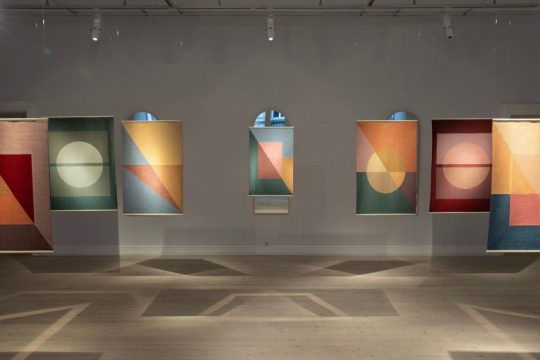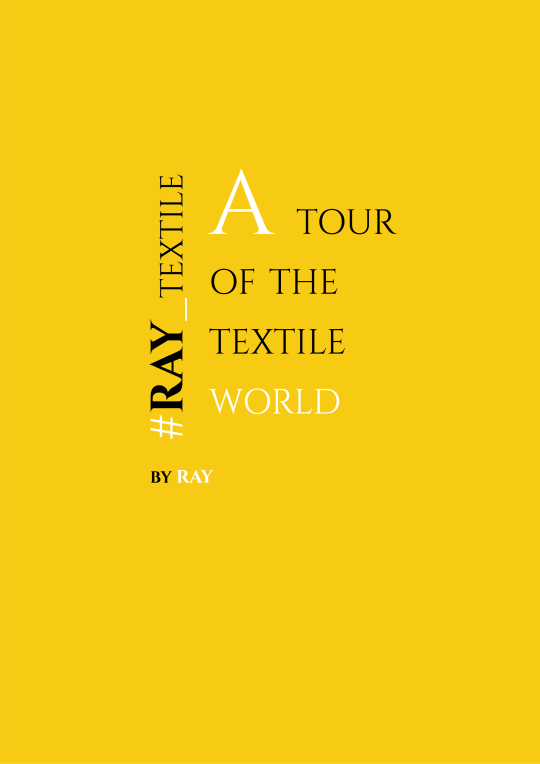#textiellab
Explore tagged Tumblr posts
Photo

The first of its kind, recreated in silk.
To commemorate 10 years of Official Glitch Textiles, this 2007 art scarf was woven at the Textielmuseum in luxurious silk and features an original motif generated with the adaptedNES.
Official Glitch Textiles since 2007
GLITCHAUS © 2018 All Rights Reserved
#original#glitchaus#textiles#digital#jacquard#design#textileart#digitalart#contemporaryart#art#modernart#generativeart#fiberart#weave#wovenpatches#artscarf#computer#computerloom#textiellab#digitalloom#fashion#artfabric#artfabrics#glitch#official#2007#2017#glitchtextiles#originalglitchtextiles#glitch textiles
6 notes
·
View notes
Text

November 22, 2018
#hoed#hat#examen#collectie#jantien verhels#sintlucas#boxtel#4ejaars#circel#kant#tule#textiellab#textielmuseum#stunning#beautiful#met toestemming van jantien
1 note
·
View note
Photo

Look 2 from our recent fashion show ‘The Chimaeric Manifesto’, made with @maxruelas, @roos_boshart_prins and @robbie.van.mierlo for @moamamsterdam MOAM Collective 2018🌷🌷🌷 Modelled by the fab @yanniekb, it’s an all-knit jacquard look (that I developed a special technique for) made at the @textielmuseum! Photo by @teampeterstigter #modernbaroque #royalcollegeofart #fashion #runway #youngdesigners #youngdesigner #textiles #looks #fashionshow #moamxzalando #gorgeous #workwear #couture #chimaera #print #knit #textielmuseum #textiellab #abstract #jacquard #blur #pixel #menswear
#pixel#print#gorgeous#jacquard#modernbaroque#menswear#moamxzalando#chimaera#royalcollegeofart#abstract#fashion#youngdesigners#knit#fashionshow#blur#textiellab#runway#youngdesigner#looks#couture#textiles#textielmuseum#workwear
0 notes
Text
Planted - Tanja Kirst: Kopenhagen (DK) bis 29.01.2023
Die Ausstellung “Planted” ist ein gutes Beispiel dafür, dass die Nachhaltigkeit der Zukunft und der große grüne Wandel nicht bedeuten, dass wir auf Ästhetik verzichten und neopuritanisch leben müssen. Durch Tanja Kirsts Installation von gewebten Teppichen in Officinet wandernd, entdeckt man sie wirklich. Es gibt ein besonderes Wechselspiel zwischen den Vorder- und Rückseiten der relativ kleinen…

View On WordPress
#Algen Tang#angewandte Kunst#Ästhetik#Citrus#Danske Kunsthåndværkere & Designere#Design#Farben#Gewebe#Handwerkskunst#Hanf#Innovation#Nachhaltigkeit#Officinet#Periodensystem#Pflanzen#Pflanzenfasern#Poesie#Tanja Kirst#Teppich#TextielLab in Tilburg#Wandel
0 notes
Text




Her Majesty Queen Máxima opened the exhibition 'Royal embroidery - stories and craftsmanship' in the TextielMuseum in Tilburg on Wednesday afternoon, November 30. The new curtains are machine embroidered in the TextielLab, the professional workshop of the TextielMuseum. Handicraft groups from all over the country and Queen Máxima have made part of the embroidery by hand in recent months. Craft, machine embroidery and the connecting value of working together and sharing stories were central to the embroidery project.
📷 Royal House of The Netherlands
62 notes
·
View notes
Photo










Rollable Ramblings
Koen Taselar
text Katalin Herzog
Jap Sam Books, Prinsenbeek (NL) 2021, 152 pages,ills col &bw, 24 x 32 cm, Softcover, Japanese binding, Dutch | English, ISBN 978-94-92852-48-9
euro 36,00
email if you want to buy :[email protected]
Made possible with the generous support of the Mondriaan Fund and Stichting Stokroos.
Koen Taselaar. Rollable Ramblings is the first comprehensive publication on the textile work of Koen Taselaar (Rotterdam, 1986).
The majority of Rollable Ramblings comprises reproductions of his tapestries, and zoom-ins on them. This visual component is complemented with essays shedding light on the works, and on the history of textile art in general, written by art critic Katalin Herzog. Special edition made in collaboration with the Textiellab, the professional workshop of the TextielMuseum. The work of Koen Taselaar is a unique universe in which only he determines the rules. He makes skillful drawings, but also clumsy ceramics and elaborate Tapestries. Taselaar’s visual language emerged from the grey area in which text is not only meaning but also form. He expresses this in drawn puns, imaginary record sleeves or large psychedelic paintings. In search of ways to process his diverse output, he makes publications and large scale drawings, which function as flat exhibition spaces. Taselaar is continuously working to further develop his wide scope, for example by learning new techniques in several residencies.
16/01/23
orders to: [email protected]
ordini a: [email protected]
twitter: @fashionbooksmi
instagram: fashionbooksmilano, designbooksmilano tumblr: fashionbooksmilano, designbooksmilano
#Koen Taselar#textile works#tapestries#skillful drawings#ceramics#textiles books#fashion books#fashionbooksmilano
9 notes
·
View notes
Video
youtube
Detail of large-scale tapestry being woven on a digital Jacquard Loom at the TextielLab in Tilburg, Netherlands May 2019
2 notes
·
View notes
Text
Q&A with Aliki van der Kruijs, Designer
Aliki van der Kruijs is a Dutch designer who invented “pluviagraphy,” a technique with which she records the falling of raindrops on textiles and porcelain as part of an ongoing project titled Made by Rain.
Made by Rain recently entered the permanent collection of Cooper Hewitt, following its inclusion in the exhibition Nature—Cooper Hewitt Design Triennial (2019-2020).
In this Q&A, van der Kruijs discusses her inspiration and design process.
What is one of your strongest memories of rain?
My strongest memory with rain is one of my earliest memories. I grew up in Nigeria, and when I was very small, I was running with my father from the carport into the monsoon rain to the street and back. I can remember being totally soaked, and that father asked me, Again? And I said yes, so we ran to the street again.
How did you develop your pluviagraphy technique?
I asked myself, How can you wear the weather? (It layers a philosophical and a practical question.) And I wanted to “catch” the rain visually, on material that is close to the body.
Made by Rain. Courtesy Aliki van der Kruijs.
First, I experimented with tissue paper and textiles, whereby two layers of material came together on top of each other and patterns formed. Because these patterns could not be properly fixed for washing and lightfastness, I started looking further.
In the TextielLab of TextielMuseum Tilburg, I developed a fabric in which the ink and the cloth are one. This makes the process simpler, and I can fix the fabrics, making them truly portable.
What inspired you to expand Made by Rain to ceramics? Do you have plans to explore more mediums with Made by Rain?
In Japan, there are more than fifty ways to describe rain. Therefore, there is a different notion of rainfall. I found that ceramics used to be a medium to transmit stories in ancient Japan, often displaying a landscape or a special event. I was curious how Made by Rain would turn out on a three-dimensional shape.
Test samples for Made by Rain. Courtesy Aliki van der Kruijs.
If I were to bring Made by Rain to another medium, it would be architecture. It would be great to explore the field of architecture with this idea, and for that I see not so much one fixed “image” of rain, but an element that can interact with the weather.
What three adjectives define “Good Design” to you? Is there a word in Dutch you might use that doesn’t translate to English?
Simple, intelligent, playful.
In preparation for creating textile patterns using rainfall, Aliki van der Kruijs created this sample blanket that explores how digital printing inks respond to water before they are fixed with heat. This textile, created in 2016, is found in the permanent collection of Cooper Hewitt.
In a reply to a question as to whether I am a designer or artist, I once replied that I like the new definition of design when adding the hyphen-minus: de-sign. I think design is very strong when a process, situation of material is de-signed, giving it a new meaning without necessarily adding or making.
from Cooper Hewitt, Smithsonian Design Museum https://ift.tt/3e5HK3w via IFTTT
2 notes
·
View notes
Photo






0 notes
Text
Her Majesty Queen Maxima of the Netherlands Visits the TextielMuseum in Tilburg
Her Majesty Queen Maxima of the Netherlands Visits the TextielMuseum in Tilburg
On Thursday, June 30, 2022, Her Majesty Queen Maxima of the Netherlands visited the TextielMuseum in Tilburg. According to RVD, the craftsmen and craftswomen are currently making the new curtains for the Chinese Hall at the Paleis Huis ten Bosch, Their Majesties residence in Den Haag. The day began with a visit to the TextielLab, which specializes in textile research and production, Her Majesty…

View On WordPress
0 notes
Photo

Découpe Numérique 2001-2017: Prepared NES tapestry ~170x200cm in cotton, wool, acrylic
#sneakpeek#glitchaus#textiles#digital#jacquard#design#jeffdonaldson#textileart#textiledesign#artfabric#artfabrics#fiberart#digitalart#tapestry#tapestryweaving#tapestryart#decoupe#numerique#decoupenumerique#textiellab#textielmuseum#glitchtextiles#originalglitchtextiles#glitch textiles
38 notes
·
View notes
Photo

Now available at gallery Zone ( http://www.galeriezone.nl/home.html ) my first Cityscape plaid & pillow set. Made at the Textiellab. Here displayed on a couch made by Frida van der Poel.
1 note
·
View note
Video
Totally wired by Rob Oo Via Flickr: A detail from an ultramodern weaving machine. TextielLab, Tilburg, The Netherlands. textielmuseum.nl/en/
#North Brabant#Netherlands#CC-BY#Nederland#Noord-Brabant#The Netherlands#Tilburg#ro016b#Textielmuseum#macro#weaving#detail#pattern
0 notes
Text





Her Majesty Queen Máxima opened the exhibition 'Royal embroidery - stories and craftsmanship' in the TextielMuseum in Tilburg on Wednesday afternoon, November 30. The new curtains are machine embroidered in the TextielLab, the professional workshop of the TextielMuseum. Handicraft groups from all over the country and Queen Máxima have made part of the embroidery by hand in recent months. Craft, machine embroidery and the connecting value of working together and sharing stories were central to the embroidery project.
📷 Patrick van Katwijk
23 notes
·
View notes
Text


Jan Taminiau working in the TextielLab.


Photo: Josefina Eikenaar-Textile Museum.
من المنسوجات التي كلف بها Textile Lab هو ما ارتدته الملكة الهولندية ماكسيما في يوم الملك في تيلبروغ عام 2017، حيث ارتدت قطعتين رداء و ثوب قام بتصميمها مصمم الأزياء Jan Taminiau ، حيث ابتكر نسيج فريد يحوي على تدرج لوني و تطريز. نسيج جاكار يتباين فيه الشنيل الأزرق الغامق الغير لامع، مع القطن اللامع، اما الفستان مصنوع من مزيج من كريب الحرير و الجورجيت و الاورجانزا، المطعم بشرائط باللون الأزرق الغامق وسلاسل معدنية ضيقة و بلورات مطرزة على القطعة.
المراجع:https://samplestudio.textiellab.nl/
https://textilemuseum.ca/
0 notes
Text
Cross-Disciplinary Color
To celebrate the opening of Saturated: The Allure and Science of Color (May 11, 2018-January 13, 2019), Object of the Day this month will feature colorful objects from the exhibition.
Raw Color, the Eindhoven-based studio of Christoph Brach and Daniera ter Haar, explores the materiality of color through research and experiments that cross disciplines.
In 2012, Raw Color was invited to collaborate with TextielLab, a studio for experimentation with state of the art knitting and weaving technologies based at the Textiel Museum in Tilburg, The Netherlands. The lab regularly invites designers working in a variety of fields to conduct research using these machines, and to explore new capabilities. The designers had already initiated a series of experiments with color, including examining the impact of a color’s physical state on perception, considering the impact of form on color, and exploring the phenomenon of optical mixing through the use of paper shredders.
Working with the team at Tilburg, they created a series of tea towels and blankets that express concepts from graphic design in woven form. In terms of both technology and terminology, there is surprisingly little overlap between print and weaving. The Index Collection uses a series of boxes similar to the screen keys seen on the sides of printed fabrics to express a gradually increasing intensity or saturation of color, from 10% to 100%. In the case of weaving, this variation in color saturation is created by altering the weave structure, from the reverse to the face of satin weave through a series of twill weaves. Each construction brings more colored yarn to the surface. The blanket also shows duotone and multitone color blending.
This object is currently on view in Saturated: The Allure and Science of Color.
Susan Brown is Associate Curator in the Textiles Department, Cooper Hewitt, Smithsonian Design Museum.
from Cooper Hewitt, Smithsonian Design Museum https://ift.tt/2J4rik5 via IFTTT
6 notes
·
View notes